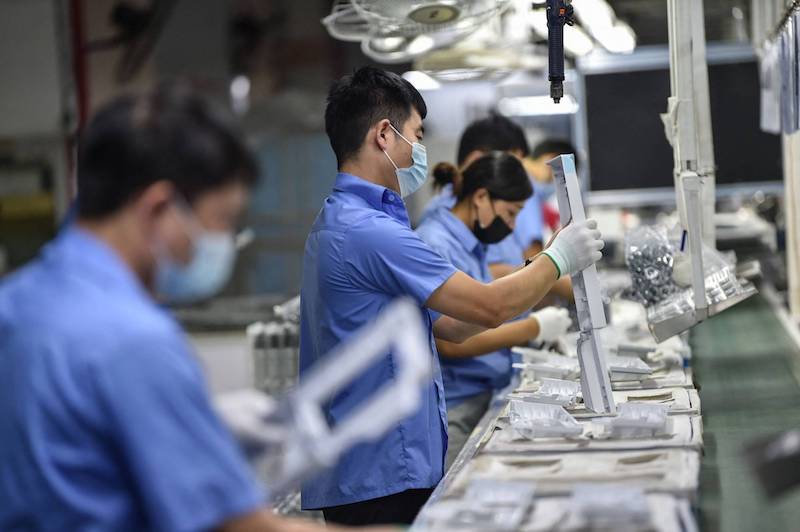China’s factory activity contracted in March as the economy faced renewed downward pressures from stringent Covid-19 controls, an official survey showed on Thursday.
The official manufacturing Purchasing Managers’ Index (PMI) fell to 49.5 in March from 50.2 in February, the National Bureau of Statistics said.
A Reuters poll had expected the PMI to ease to 49.9, a notch below the 50-point mark that separates contraction from growth on a monthly basis.
The output subindex dropped from 50.4 to 49.5, while new order subindex was down to 48.8 from 50.7.
“The latter suggests that the weakness may continue into the second quarter as expectations remain depressed,” said Zhu Chaoping, global market strategist at JP Morgan Asset Management in Shanghai.
Meanwhile, as a result of lockdowns, supplier delivery time extended significantly, with the subindex down to 46.5 from 48.2.
China’s official composite PMI, which includes both manufacturing and services activity, stood at 48.8, compared with 51.2 in February.
“The service sector is particularly worrisome since the restrictive measures applied by local governments to stop the spread of the virus directly affect people’s mobility,” Alicia García Herrero, China economist at Natixis, said.
The world’s second-largest economy is at risk of further slowing as authorities restrict production and mobility in many cities including the financial centre Shanghai and tech hub Shenzhen under its zero-Covid policy.
“There is, without doubt, some uncertainty reflected in these numbers, mainly on supply chains,” said Iris Pang, chief China economist at ING. “But we are slightly more optimistic than the market in general.”
Pang said that next month, most of the population should be able to return to work as usual after this lockdown.
“As such, we expect both manufacturing and non-manufacturing PMI should be able to move back above 50 in April.”
One uncertainty, however, is that people with positive Covid-19 cases found from this round of mass tests could remain in isolation facilities in April.
“For financial service workers, they may be able to work from isolation facilities, just like they work from home. But this is not applicable to factories and port workers,” Pang added.
- George Russell, with Reuters
READ MORE:
China’s Truckers Fake Records to Outwit Covid Curbs
US, Russian Envoys to Meet in China Over Afghanistan
US Supplier Signs China LNG Deal as Output Ramps Up
























